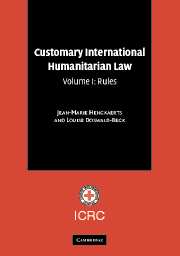Book contents
- Frontmatter
- Contents
- Foreword by ICRC President Jakob Kellenberger
- Foreword by Judge Abdul G. Koroma
- Foreword by Yves Sandoz
- Acknowledgements
- Introduction
- List of abbreviations
- Part I The Principle of Distinction
- Part II Specifically Protected Persons and Objects
- Part III Specific Methods of Warfare
- Part IV Weapons
- Part V Treatment of Civilians and Persons Hors De Combat
- Part VI Implementation
- Chapter 40 Compliance with International Humanitarian Law (Rules 139–143)
- Chapter 41 Enforcement of International Humanitarian Law (Rules 144–148)
- Chapter 42 Responsibility and Reparation (Rules 149–150)
- Chapter 43 Individual Responsibility (Rules 151–155)
Chapter 41 - Enforcement of International Humanitarian Law (Rules 144–148)
Published online by Cambridge University Press: 05 June 2012
- Frontmatter
- Contents
- Foreword by ICRC President Jakob Kellenberger
- Foreword by Judge Abdul G. Koroma
- Foreword by Yves Sandoz
- Acknowledgements
- Introduction
- List of abbreviations
- Part I The Principle of Distinction
- Part II Specifically Protected Persons and Objects
- Part III Specific Methods of Warfare
- Part IV Weapons
- Part V Treatment of Civilians and Persons Hors De Combat
- Part VI Implementation
- Chapter 40 Compliance with International Humanitarian Law (Rules 139–143)
- Chapter 41 Enforcement of International Humanitarian Law (Rules 144–148)
- Chapter 42 Responsibility and Reparation (Rules 149–150)
- Chapter 43 Individual Responsibility (Rules 151–155)
Summary
Rule 144. States may not encourage violations of international humanitarian law by parties to an armed conflict. They must exert their influence, to the degree possible, to stop violations of international humanitarian law.
Practice
Volume II, Chapter 41, Section A.
Summary
State practice establishes this rule as a norm of customary international law applicable in both international and non-international armed conflicts.
International and non-international armed conflicts
Common Article 1 of the Geneva Conventions provides that States parties undertake to “ensure respect for the present Convention”. The same provision is repeated in Additional Protocol I in relation to respect for the provisions of that Protocol. Additional Protocol I further provides that in the event of serious violations of the Protocol, States parties undertake to act, jointly or individually, in cooperation with the United Nations and in conformity with the Charter of the United Nations. A similar provision is included in the Second Protocol to the Hague Convention for the Protection of Cultural Property.
Beginning with its commentary on common Article 1 of the Geneva Conventions, the ICRC has repeatedly stated that the obligation to “ensure respect” is not limited to behaviour by parties to a conflict, but includes the requirement that States do all in their power to ensure that international humanitarian law is respected universally.
The interpretation that common Article 1 involves obligations beyond those of the parties to the conflict was supported by the UN Security Council in a resolution adopted in 1990 calling on States parties to the Fourth Geneva Convention to ensure respect by Israel for its obligations, in accordance with Article 1 of the Convention.
- Type
- Chapter
- Information
- Customary International Humanitarian Law , pp. 509 - 529Publisher: Cambridge University PressPrint publication year: 2005
- 4
- Cited by



